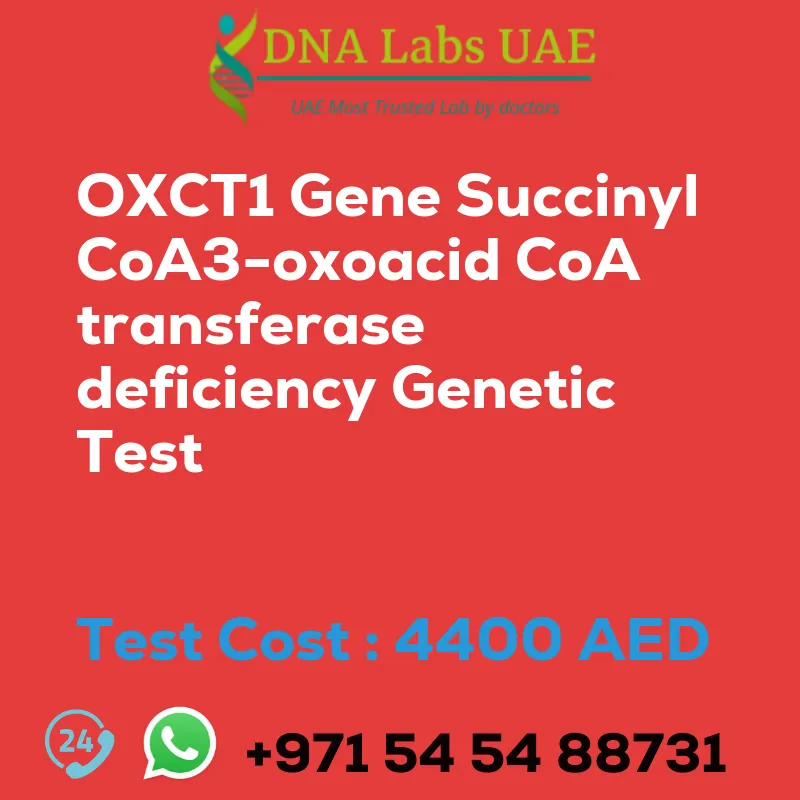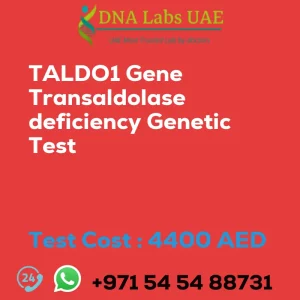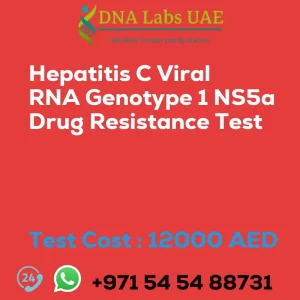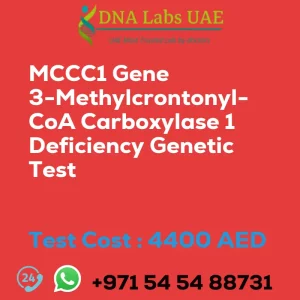OXCT1 Gene Succinyl CoA3-oxoacid CoA transferase deficiency Genetic Test
Test Name: OXCT1 Gene Succinyl CoA3-oxoacid CoA transferase deficiency Genetic Test
Components: NGS Technology
Price: 4400.0 AED
Sample Condition: Blood or Extracted DNA or One drop Blood on FTA Card
Report Delivery: 3 to 4 Weeks
Test Type: Metabolic Disorders
Doctor: General Physician
Test Department: Genetics
Pre Test Information: Clinical History of Patient who is going for OXCT1 Gene Succinyl CoA:3-oxoacid CoA transferase deficiency NGS Genetic DNA Test. A Genetic Counselling session to draw a pedigree chart of family members affected with Succinyl CoA:3-oxoacid CoA transferase deficiency.
Test Details:
OXCT1 gene succinyl CoA:3-oxoacid CoA transferase deficiency is a rare genetic disorder that affects the metabolism of certain amino acids and fats. It is caused by mutations in the OXCT1 gene, which provides instructions for making an enzyme called succinyl CoA:3-oxoacid CoA transferase. The enzyme is involved in a process called ketone body metabolism, which helps convert certain amino acids and fats into energy when glucose is not readily available.
In individuals with OXCT1 gene succinyl CoA:3-oxoacid CoA transferase deficiency, the enzyme is not produced in sufficient amounts or is not functional, leading to a buildup of toxic substances in the body. Symptoms of this condition can vary widely but may include developmental delays, intellectual disability, seizures, low muscle tone, poor feeding, and failure to thrive. Some affected individuals may also have liver problems or abnormalities in the brain.
NGS (Next-Generation Sequencing) genetic testing can be used to identify mutations in the OXCT1 gene that cause succinyl CoA:3-oxoacid CoA transferase deficiency. This type of testing allows for the simultaneous analysis of multiple genes and can provide a more comprehensive assessment of an individual’s genetic makeup.
Genetic testing can help confirm a diagnosis, guide treatment decisions, and provide information about the risk of passing the condition on to future generations. It may also help in the identification of other family members who may be at risk of carrying the same genetic mutation.
It is important to consult with a healthcare professional or a genetic counselor to discuss the benefits, limitations, and potential risks of genetic testing before undergoing the procedure.
| Test Name | OXCT1 Gene Succinyl CoA3-oxoacid CoA transferase deficiency Genetic Test |
|---|---|
| Components | |
| Price | 4400.0 AED |
| Sample Condition | Blood or Extracted DNA or One drop Blood on FTA Card |
| Report Delivery | 3 to 4 Weeks |
| Method | NGS Technology |
| Test type | Metabolic Disorders |
| Doctor | General Physician |
| Test Department: | Genetics |
| Pre Test Information | Clinical History of Patient who is going for OXCT1 Gene Succinyl CoA:3-oxoacid CoA transferase deficiency NGS Genetic DNA Test A Genetic Counselling session to draw a pedigree chart of family members affected with Succinyl CoA:3-oxoacid CoA transferase deficiency |
| Test Details |
OXCT1 gene succinyl CoA:3-oxoacid CoA transferase deficiency is a rare genetic disorder that affects the metabolism of certain amino acids and fats. It is caused by mutations in the OXCT1 gene, which provides instructions for making an enzyme called succinyl CoA:3-oxoacid CoA transferase. The enzyme is involved in a process called ketone body metabolism, which helps convert certain amino acids and fats into energy when glucose is not readily available. In individuals with OXCT1 gene succinyl CoA:3-oxoacid CoA transferase deficiency, the enzyme is not produced in sufficient amounts or is not functional, leading to a buildup of toxic substances in the body. Symptoms of this condition can vary widely but may include developmental delays, intellectual disability, seizures, low muscle tone, poor feeding, and failure to thrive. Some affected individuals may also have liver problems or abnormalities in the brain. NGS (Next-Generation Sequencing) genetic testing can be used to identify mutations in the OXCT1 gene that cause succinyl CoA:3-oxoacid CoA transferase deficiency. This type of testing allows for the simultaneous analysis of multiple genes and can provide a more comprehensive assessment of an individual’s genetic makeup. Genetic testing can help confirm a diagnosis, guide treatment decisions, and provide information about the risk of passing the condition on to future generations. It may also help in the identification of other family members who may be at risk of carrying the same genetic mutation. It is important to consult with a healthcare professional or a genetic counselor to discuss the benefits, limitations, and potential risks of genetic testing before undergoing the procedure. |








